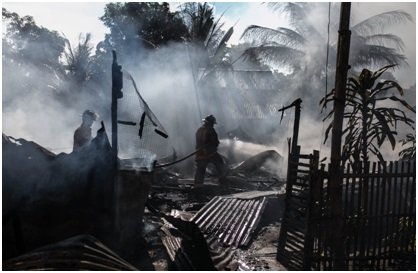With hurricanes Lee, Idalia, Hilary, Nicole, and Ian battering New York, Florida, California, and South Carolina within the past year, families all over the coastal U.S. are trying to find ways to help each other out and stay safe from the damaging effects of flooding and wind. It makes everyone take a step back and think about how they can better prepare themselves and their families for a natural disaster in their area.
What is defined as a natural disaster? Hurricanes, forest fires, tornadoes, and earthquakes are just a few examples of the storms Mother Nature throws our way. Each disaster requires its own unique set of precautions, and we’ll try to cover as many of them as possible.
Buying earthquake insurance, putting together an emergency supplies kit, and having a place to go for shelter in case of an emergency are just some of the ways to be prepared for a natural disaster.
#1 – Identify Emergency Exits
One of the most important things for every family to do is plan how to get out of their house in case of an emergency such as a forest fire. Many experts suggest setting up a drill as schools do with students. Knowing beforehand how to get out of your house from any room in the building makes it much easier if there is ever an emergency, and it creates less panic.
Windows
Most rooms in your house should have windows. Exiting through a window is one of the most practical ways to get to safety during an emergency if a fire is blocking the door, but you have to be aware of what story you’re on when leaving through a window.
If you’re upstairs, this plan is more complicated. Have a ladder outside of the windows on the second floor so you can go through them.
Fire Extinguishers
If a fire is blocking the door of a room that doesn’t have windows, plan on exiting to the nearest room with windows. Think about keeping a fire extinguisher in the rooms that don’t have any way to exit. Most experts suggest you should have one fire extinguisher for each floor in the house.
Fire Alarms
Every room should have a fire alarm so you know when it’s time to leave the house. Kids need to be informed by parents where they need to exit when they hear the fire alarm go off. Talk to them about the exit plan, fire extinguishers, windows, and any other potential exits. Let them know where to wait for an adult if they exit their room or the house by themselves.
#2 – Put Together a Supply Kit
Whether you’re preparing for a fire disaster or flooding, you may need to evacuate your home for days or weeks at a time when a storm strikes. Having an emergency supply kit is one of the best ways to make sure everyone has the proper nutrition they need to survive and thrive in the face of danger.
Make sure to pack food that doesn’t easily spoil such as
- granola bars
- cereal
- water
- sports drinks
- canned food
- dried fruit like raisins or craisins
Don’t ever put food items that easily spoil in your kit. Dairy products, popsicles, and other frozen treats go bad when they’re not stored properly. Emergency kits need to be filled with items that can be stored at room temperature because you’re most likely to need the food when you’ve escaped from a disaster at your home.
Find foods your kids might be interested in so they feel more comfortable and at home even during a disaster. Fun cereals with colorful characters or fruit snacks with cool designs will get your children excited about eating even when there’s an emergency.
#3 – Learn What Disasters Happen Locally
Not every region in the U.S. has the same types of natural disasters. It’s important to know what weather affects the region you live in. Florida has hurricanes, while California has forest fires and earthquakes. The Midwestern states have tornadoes, and island states like Hawaii are at risk of volcanic activity.
Listen to your local news and follow directions when an emergency is about to occur. Sometimes it can be emotional and stressful to flee your home before a natural disaster strikes. Bond with your family and friends and create a plan where everybody can meet up during an evacuation.
#4 – Have a Savings Account
It’s always smart to have an emergency savings account in case you need to access some extra money for emergencies. In the same way you’d save for a financial emergency, you can save for a natural disaster. Doing this will allow you to buy extra clothing, food, water, medical expenses, and other necessities while you’re away from home.
Think about how much you can afford to put away each month without making it impossible to pay for your normal daily expenses. Pick out a savings account that has a solid interest rate so you can build your savings without having to even think about it.
Pool your money with other people you love and care about during a disaster. If you all put your emergency funds together after a hurricane or a tornado, you’ll often have enough to survive during your temporary time away from your home.
#5 – Buy the Right Amount of Insurance
It should never be assumed that your homeowners insurance will automatically cover the damages from a natural disaster. You need to talk to your insurance company about what types of weather damage are covered in your policy, and you may have to purchase a separate policy or additional coverage for certain disasters.
For example, no matter how many Californians experience home damage due to an earthquake, California home insurance companies often require additional coverage. The same thing often applies in hurricane-ridden states like Florida or Louisiana.
There’s no perfect way to prepare for a natural disaster, but checking off these vital items is a good way to start. Having sufficient amounts of non-perishable foods, knowing how to exit your home during a disaster, and having money in reserve to pay for supplies while away from home are all the most essential things to do. If you start with these, you’re on the right track.

Shawn Laib writes and researches for the insurance comparison site, Clearsurance.com. He wants to make sure people understand how to prepare for emergencies such as hurricanes, forest fires, volcanic eruptions, and tornadoes.








